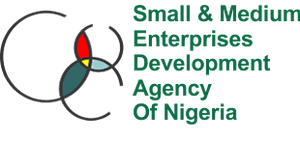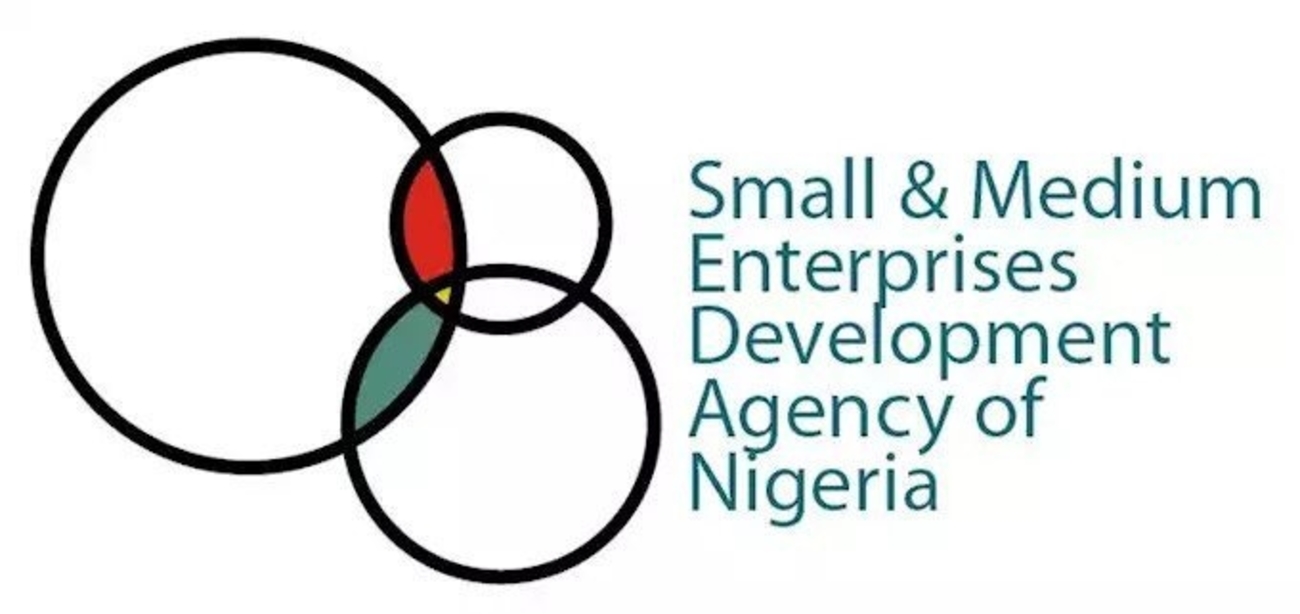 The Small and Medium Enterprises Development Agency (SMEDAN) has embarked on a massive data collection across commercial cities in the country.
The Small and Medium Enterprises Development Agency (SMEDAN) has embarked on a massive data collection across commercial cities in the country.
The ultimate aim of the initiative is to update statistics about the number of micro small and medium enterprises operating in the country and properly plan for them.
Business correspondent, Tolulope Ogunjobi reports that there is a growing recognition of the important roles that Micro, Small and Medium Enterprises play in economic development.
According to the national bureau of statistics, in 2014, more than 37 million micro small and medium enterprises operate in the country—employing more than 59 million workers.
This shows that MSMEs contributed 48.47 percent or N38.78 trillion to Nigeria’s GDP and 7.07 percent to export earnings.
To validate this data, the small and medium enterprises agency has engaged a private firm to put up an up to date data to aid proper planning.
Business owners at this gathering see this move as a welcome development. They agree that accurate data gathering will help to address challenges that businesses face in a developing country like Nigeria.
Members of the business community recommend that the various intervention programs of the government should be strengthened to help ameliorate challenges faced by MSME’s across the country.
 The Small and Medium Enterprises Development Agency (SMEDAN) has embarked on a massive data collection across commercial cities in the country.
The Small and Medium Enterprises Development Agency (SMEDAN) has embarked on a massive data collection across commercial cities in the country.
The ultimate aim of the initiative is to update statistics about the number of micro small and medium enterprises operating in the country and properly plan for them.
Business correspondent, Tolulope Ogunjobi reports that there is a growing recognition of the important roles that Micro, Small and Medium Enterprises play in economic development.
According to the national bureau of statistics, in 2014, more than 37 million micro small and medium enterprises operate in the country—employing more than 59 million workers.
This shows that MSMEs contributed 48.47 percent or N38.78 trillion to Nigeria’s GDP and 7.07 percent to export earnings.
To validate this data, the small and medium enterprises agency has engaged a private firm to put up an up to date data to aid proper planning.
Business owners at this gathering see this move as a welcome development. They agree that accurate data gathering will help to address challenges that businesses face in a developing country like Nigeria.
Members of the business community recommend that the various intervention programs of the government should be strengthened to help ameliorate challenges faced by MSME’s across the country.
 The Small and Medium Enterprises Development Agency (SMEDAN) has embarked on a massive data collection across commercial cities in the country.
The Small and Medium Enterprises Development Agency (SMEDAN) has embarked on a massive data collection across commercial cities in the country.
The ultimate aim of the initiative is to update statistics about the number of micro small and medium enterprises operating in the country and properly plan for them.
Business correspondent, Tolulope Ogunjobi reports that there is a growing recognition of the important roles that Micro, Small and Medium Enterprises play in economic development.
According to the national bureau of statistics, in 2014, more than 37 million micro small and medium enterprises operate in the country—employing more than 59 million workers.
This shows that MSMEs contributed 48.47 percent or N38.78 trillion to Nigeria’s GDP and 7.07 percent to export earnings.
To validate this data, the small and medium enterprises agency has engaged a private firm to put up an up to date data to aid proper planning.
Business owners at this gathering see this move as a welcome development. They agree that accurate data gathering will help to address challenges that businesses face in a developing country like Nigeria.
Members of the business community recommend that the various intervention programs of the government should be strengthened to help ameliorate challenges faced by MSME’s across the country.
 The Small and Medium Enterprises Development Agency (SMEDAN) has embarked on a massive data collection across commercial cities in the country.
The Small and Medium Enterprises Development Agency (SMEDAN) has embarked on a massive data collection across commercial cities in the country.
The ultimate aim of the initiative is to update statistics about the number of micro small and medium enterprises operating in the country and properly plan for them.
Business correspondent, Tolulope Ogunjobi reports that there is a growing recognition of the important roles that Micro, Small and Medium Enterprises play in economic development.
According to the national bureau of statistics, in 2014, more than 37 million micro small and medium enterprises operate in the country—employing more than 59 million workers.
This shows that MSMEs contributed 48.47 percent or N38.78 trillion to Nigeria’s GDP and 7.07 percent to export earnings.
To validate this data, the small and medium enterprises agency has engaged a private firm to put up an up to date data to aid proper planning.
Business owners at this gathering see this move as a welcome development. They agree that accurate data gathering will help to address challenges that businesses face in a developing country like Nigeria.
Members of the business community recommend that the various intervention programs of the government should be strengthened to help ameliorate challenges faced by MSME’s across the country.
 The Small and Medium Enterprises Development Agency (SMEDAN) has embarked on a massive data collection across commercial cities in the country.
The Small and Medium Enterprises Development Agency (SMEDAN) has embarked on a massive data collection across commercial cities in the country.
The ultimate aim of the initiative is to update statistics about the number of micro small and medium enterprises operating in the country and properly plan for them.
Business correspondent, Tolulope Ogunjobi reports that there is a growing recognition of the important roles that Micro, Small and Medium Enterprises play in economic development.
According to the national bureau of statistics, in 2014, more than 37 million micro small and medium enterprises operate in the country—employing more than 59 million workers.
This shows that MSMEs contributed 48.47 percent or N38.78 trillion to Nigeria’s GDP and 7.07 percent to export earnings.
To validate this data, the small and medium enterprises agency has engaged a private firm to put up an up to date data to aid proper planning.
Business owners at this gathering see this move as a welcome development. They agree that accurate data gathering will help to address challenges that businesses face in a developing country like Nigeria.
Members of the business community recommend that the various intervention programs of the government should be strengthened to help ameliorate challenges faced by MSME’s across the country.
 The Small and Medium Enterprises Development Agency (SMEDAN) has embarked on a massive data collection across commercial cities in the country.
The Small and Medium Enterprises Development Agency (SMEDAN) has embarked on a massive data collection across commercial cities in the country.
The ultimate aim of the initiative is to update statistics about the number of micro small and medium enterprises operating in the country and properly plan for them.
Business correspondent, Tolulope Ogunjobi reports that there is a growing recognition of the important roles that Micro, Small and Medium Enterprises play in economic development.
According to the national bureau of statistics, in 2014, more than 37 million micro small and medium enterprises operate in the country—employing more than 59 million workers.
This shows that MSMEs contributed 48.47 percent or N38.78 trillion to Nigeria’s GDP and 7.07 percent to export earnings.
To validate this data, the small and medium enterprises agency has engaged a private firm to put up an up to date data to aid proper planning.
Business owners at this gathering see this move as a welcome development. They agree that accurate data gathering will help to address challenges that businesses face in a developing country like Nigeria.
Members of the business community recommend that the various intervention programs of the government should be strengthened to help ameliorate challenges faced by MSME’s across the country.
 The Small and Medium Enterprises Development Agency (SMEDAN) has embarked on a massive data collection across commercial cities in the country.
The Small and Medium Enterprises Development Agency (SMEDAN) has embarked on a massive data collection across commercial cities in the country.
The ultimate aim of the initiative is to update statistics about the number of micro small and medium enterprises operating in the country and properly plan for them.
Business correspondent, Tolulope Ogunjobi reports that there is a growing recognition of the important roles that Micro, Small and Medium Enterprises play in economic development.
According to the national bureau of statistics, in 2014, more than 37 million micro small and medium enterprises operate in the country—employing more than 59 million workers.
This shows that MSMEs contributed 48.47 percent or N38.78 trillion to Nigeria’s GDP and 7.07 percent to export earnings.
To validate this data, the small and medium enterprises agency has engaged a private firm to put up an up to date data to aid proper planning.
Business owners at this gathering see this move as a welcome development. They agree that accurate data gathering will help to address challenges that businesses face in a developing country like Nigeria.
Members of the business community recommend that the various intervention programs of the government should be strengthened to help ameliorate challenges faced by MSME’s across the country.
 The Small and Medium Enterprises Development Agency (SMEDAN) has embarked on a massive data collection across commercial cities in the country.
The Small and Medium Enterprises Development Agency (SMEDAN) has embarked on a massive data collection across commercial cities in the country.
The ultimate aim of the initiative is to update statistics about the number of micro small and medium enterprises operating in the country and properly plan for them.
Business correspondent, Tolulope Ogunjobi reports that there is a growing recognition of the important roles that Micro, Small and Medium Enterprises play in economic development.
According to the national bureau of statistics, in 2014, more than 37 million micro small and medium enterprises operate in the country—employing more than 59 million workers.
This shows that MSMEs contributed 48.47 percent or N38.78 trillion to Nigeria’s GDP and 7.07 percent to export earnings.
To validate this data, the small and medium enterprises agency has engaged a private firm to put up an up to date data to aid proper planning.
Business owners at this gathering see this move as a welcome development. They agree that accurate data gathering will help to address challenges that businesses face in a developing country like Nigeria.
Members of the business community recommend that the various intervention programs of the government should be strengthened to help ameliorate challenges faced by MSME’s across the country.














